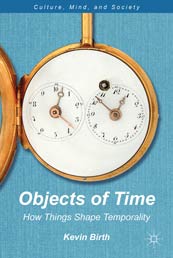
While reading Kevin Birth‘s Objects of Time: How Things Shape Temporality, I wondered if weekends provide an opportunity to tell time differently.
There is a danger in viewing the clock as necessary for certain cognitive tasks simply because we use it for those tasks. The importance of clock time in twenty-first-century economic practices cannot be used as grounds for assuming that it was necessary for economic practices in the medieval period. This misconception is key to the view of medieval timekeeping as irregular or even nonexistent. As Rothwell points out, the use of clock time to represent the canonical hours of the Middle Ages distorts how time was reckoned, and “is at the root of many misunderstandings about the measurement of time in the Middle Ages” (1959, 241). This should give some cause for concern about the assumption that there was a lack of time consciousness in the Middle Ages because no clocks were used, and this also raises the very real possibility that the time consciousness of the Middle Ages is simply not translatable into clock time — or put another way, time consciousness in the Middle Ages is not embedded in the logic of design of our modern clocks. This lack of uniform clock time is not a lack of awareness of time. On the contrary before the clock both informal and disciplined activities relied on ideas of timing and time derived from a variety of environmental and liturgical cues (Glennie and Thrift 2002, 159) — liturgical cues were publicly significant because they were often signaled by bells and adapted to secular purposes, as will be discussed later. How time was reckoned in medieval Europe in comparison to industrial Europe reveals a shift in cognitive process away from the perception of multiple indicators of time that needed to be reconciled, and toward modern horological thought that unquestioningly relies on clocks to measure duration to indicate time.” — p. 52.
How would you describe your “time consciousness” and that of your colleagues? . . .
- Do find yourself more relaxed regarding the clock on weekends, relying on other indicators to tell time, or does the clock rule 24/7, 7 days a week?
- Do you take a “Sabbath rest” from the clock? If not, could you imagine doing such, maybe just taking a periodic weekend retreat at a monastery, Christian camp, or state park?
- Do you feel any attraction toward the “simple life” of the monastics or the the general populace of the Middle Ages? Could you imagine living in such a “culture” . . . “time?”
- Earlier post in series, “What, then, is time?”
- More coming, as time permits 😉
Tom enjoys daily conversations regarding living out the Biblical Story with his wife Theresa and their four girls, around the block, at Elizabethtown Brethren in Christ Church (where he teaches adult electives and co-leads a small group), among healthcare professionals as the Northeast Regional Director for the Christian Medical & Dental Associations (CMDA), and in higher ed as a volunteer with the Emerging Scholars Network (ESN). For a number of years, the Christian Medical Society / CMDA at Penn State College of Medicine was the hub of his ministry with CMDA. Note: Tom served with InterVarsity Christian Fellowship / USA for 20+ years, including 6+ years as the Associate Director of ESN. He has written for the ESN blog from its launch in August 2008. He has studied Biology (B.S.), Higher Education (M.A.), Spiritual Direction (Certificate), Spiritual Formation (M.A.R.), Ministry to Emerging Generations (D.Min.). To God be the glory!

One of the luxuries I enjoy about vacations and some weekends is having to pay little attention to the clock. I don’t know how often I get to fully ignore it, but even that reduced interaction with “wall time” is very relaxing.
On a completely different thought, there is an argument to be made that some of the irregularities in the financial markets can be linked to overprecise measuring of time. Computerized trading algorithms are capable of making transactions in minuscule fractions of a second. And yet, in theory all of our financial instruments are tied to the actual value of objects (like homes) or entities (like corporations). It seems odd to think that the actual value of something can change at all in a time span less than a second. Thus, there is a risk of the financial instruments becoming partially or completely disconnected from the value that is supposed to be their foundation; arguably, this is exactly what has already happened.